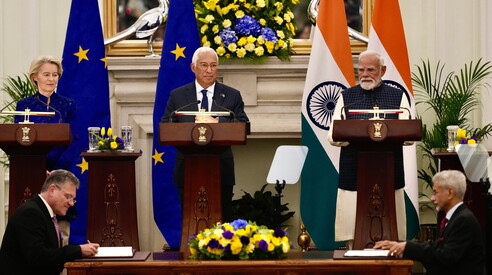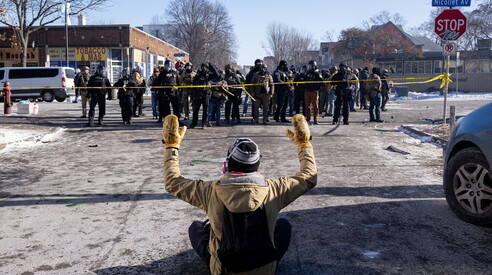
foto Ansa
Il foglio tradotto
The Almasri case: what doesn't add up in Italy's memorandum to the ICC
Il Foglio has reviewed the response sent by the Italian government to the International Criminal Court (ICC) regarding the failure to arrest the Libyan commander. Questions remain: the lack of communication with The Hague, the mystery of the extradition request, the role of militias, and Libya’s uncertain future.
The Italian government, in its memorandum to the International Criminal Court (ICC) — obtained by Il Foglio — cited two main reasons to justify the failure to execute the arrest warrant for crimes against humanity issued by The Hague against Osama Njeim Almasri, head of Libya’s prison police. Almasri was detained in Italy on January 19 and repatriated to Libya two days later. Both justifications offered by Italy are unconvincing, both factually and legally.
First, the government claims it could not act on the arrest warrant due to “inconsistencies” regarding the timeline of Almasri’s alleged crimes. The war crimes and crimes against humanity, including murder, torture, and sexual violence, are said to have started in 2011, but some parts of the warrant indicate 2015. For the Italian government (and Justice Minister Carlo Nordio, who emphasized this point in Parliament), this discrepancy constitutes a serious flaw, undermining a key element of the arrest request.
In reality, these were typographical errors, which the ICC corrected by issuing an updated warrant on February 25 — by which time Almasri had already been sent back to Libya. Moreover, identifying such formal issues was not the responsibility of the Italian justice minister, but rather of Almasri’s defense. Notably, the ICC had attached a note to the original warrant encouraging the government to promptly contact the Court if any issues arose that could hinder the arrest. Italy, however, never reached out to seek clarification on the date errors.
The second reason cited by Italy for failing to arrest Almasri was a (supposed, as we shall see) simultaneous extradition request from Libya. A few hours after the Libyan commander was detained in Turin, Libyan authorities — via their embassy in Italy — allegedly informed Italy’s Foreign Ministry, and in turn the Justice Ministry, of an ongoing investigation into Almasri in Libya for the same crimes mentioned in the ICC warrant. Thus, Libya requested his extradition. “Faced with competing requests, Italy had to evaluate which one should take precedence,” reads the Italian memorandum to the ICC, referring to Article 90 of the Rome Statute. In fact, the article cited states that in the case of competing requests (from the ICC and another country), the ICC’s request must take priority.
It is likely for this reason that the Italian government went even further in its memo, arguing that since the ICC’s arrest warrant made no mention of a Libyan investigation into Almasri, the warrant should be considered inadmissible under Article 17 of the Rome Statute. In essence, the Italian government astonishingly assumed the authority to evaluate the validity — and even the admissibility — of the ICC’s warrant, without engaging in any dialogue with the Court.
These elements alone make Italy’s position appear extremely weak. It becomes increasingly clear that the failure to execute the international arrest warrant stemmed not from legal technicalities, but from a deliberate political choice by the Italian government.
To make matters worse, last Sunday Libyan Prime Minister Abdulhamid Dabaiba disavowed Almasri and contradicted Italy’s defense in a national address. “I didn’t request his extradition, I don’t know who he is, and I’ve never met him. How can we trust a man who raped a 14-year-old girl?” he said, referring to Almasri. This implies that the extradition request cited by Italy in its response to the ICC may never have existed.
The case now ties into the broader crisis that has pushed Libya to the brink of civil war over the past two weeks, with the head of the prison police becoming Dabaiba’s last-ditch bargaining chip. The prime minister had never before commented on the matter, as Almasri held no prominent position and was not a high priority. But things changed recently as the fighting in Tripoli — triggered by Dabaiba himself — now threatens to cost him his presidency, at best.
On Sunday, Dabaiba admitted that some militias had pressured him to secure Almasri’s release — something that had long been suspected. Immediately after Almasri’s arrest, his superior Abdul Rauf Kara, leader of the Rada militia, showed up in Dabaiba’s office and demanded action to secure his release from Italy. To avoid a rift with Kara, whose militia controls Mitiga airport, Dabaiba complied, and within hours Almasri was back in Libya. “The problem for the prime minister or for Kara was never Almasri himself,” explains Jalel Harchaoui, Libya expert at the Royal United Services Institute, a British think tank. “The real concern was setting a precedent. If Dabaiba hadn’t intervened to free Almasri, other militia leaders allied with him and wanted by the ICC would have reacted poorly.”
To this extremely delicate situation was added a bombshell announcement of a cooperation agreement between the ICC and Libya. On Thursday, ICC Prosecutor Karim Khan stated that the Libyan government had agreed to recognize the Court’s jurisdiction and, in light of this, called on Tripoli’s prosecutor, Siddiq al-Sour, to arrest and hand over Almasri to the Court. Yet this scenario remains unlikely: Dabaiba lacks the authority. On Monday, the Tobruk Parliament reminded everyone that Dabaiba’s mandate expired three years ago and thus he has no authority to sign international agreements. Before that, Mohamed al-Menfi, President of the Presidential Council, opposed Dabaiba’s order to dissolve Rada and remove Almasri. The result? Rada still controls Mitiga, and Almasri is still in office.
Dabaiba’s good faith is also in doubt given that members of his inner circle are reportedly under ICC investigation. Eleven sealed arrest warrants have already been issued, with seven targeting militia leaders close to the prime minister. Around 80 more individuals are under investigation, many now living in fear of suffering Almasri’s fate if they attempt to leave Libya.
So how should Dabaiba’s willingness to cooperate with the ICC be interpreted, especially when it could antagonize his militia allies? In an attempt to gain full control over Tripoli and escape militia blackmail, Dabaiba recently ousted Abdul Ghani al-Kikli (aka Ghnewa), and then attempted an offensive against Rada and the prison police, to which Almasri belongs. This part of the plan failed due to Rada’s violent response and mass protests demanding the government’s resignation. “By publicly accusing Almasri, the prime minister is trying to present a version of events that justifies his recent attacks against Rada and the prison police and calms public anger,” explains Harchaoui. From Tripoli, many see Dabaiba’s move as a last-ditch effort to cling to power — or even just save himself. Another large and potentially violent protest is expected this Friday in Tripoli, as rumors swirl of secret meetings and growing alliances among militia leaders — particularly Kara and Revolutionary Guards chief Haitham Tajuri — who appear ready to remove Dabaiba by any means necessary.
This article is translated by artificial intelligence. If you want to report errors you can write to [email protected]





